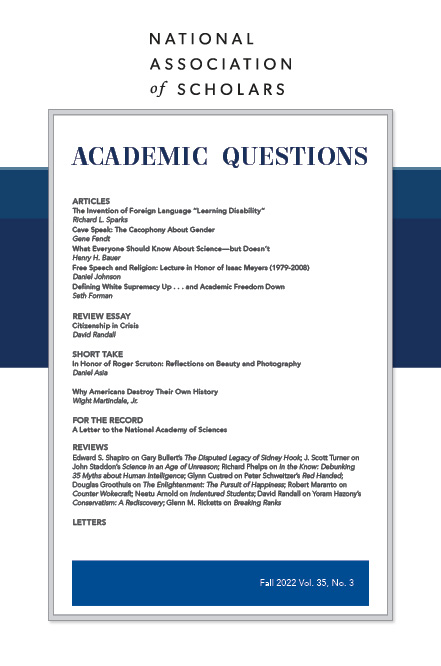The Enlightenment: The Pursuit of Happiness: 1680-1790, Richie Robertson, Harper, 2021, pp. 1008, $45.
Douglas Groothuis is Professor of Philosophy, Denver Seminary; [email protected]. He is the author of : Fire in the Streets: How You Can Confidently Respond to Today’s Incendiary Cultural Topics (Salem Books, 2022); Christian Apologetics: A Comprehensive Case for Biblical Faith, 2nd ed.; and Truth Decay: Defending Christianity Against the Challenges of Postmodernism. Groothius wrote “Critical Race Theory in Six Logical Fallacies” for our Summer 2022 issue.
The Enlightenment has a contested legacy. First, for some it is a placeholder for nearly all that’s beneficial for society; for others, for nearly all that is detrimental. For some secularists, it was a nearly golden age, or “the age of reason.” (But not so for the anti-humanist, secularist, John Gray.) Its very name—as opposed to the Dark Ages—is a hagiographic benediction. Secular thinkers such as Steven Pinker, author of Enlightenment Now (2018), uses the term in this commendatory way, and with little historical nuance. Secondly, and alternatively, postmodernists usually take the Enlightenment or “the Enlightenment project” as the apotheosis of modernism, a benighted attempt to find objective truth through the application of universal reason and science, and which looked to science as the engine of progress. Worse yet, it is seen as one of the motivations for colonialism, racism, and other ills. A third view is that the Enlightenment is defined by the rebellious attempt to find truth, meaning, and purpose apart from biblical revelation and the counsel of the church. In this, it agrees with the secular view given above, but makes a far different judgment about it.
These interpretations, of course, do not exhaust the options available to those interested in studying the Enlightenment and its legacy. Into the academic fray comes a massive, well-written, and assiduously documented assessment of the Enlightenment from a noteworthy scholar, Ritchie Robertson, Professor of German at Oxford. Robertson reports that he has not written a book about books about the Enlightenment. Instead, he consulted primary sources as well as those usually ignored, such as Enlightenment fiction, drama, and poetry. His attention is not merely given to Enlightenment ideas, but also to the practices in everyday areas such as farming, medicine, and politics. He has arranged fourteen of the chapters thematically to discuss aspects of the Enlightenment, such as tolerance, science, religion, history writing, aesthetics, and revolution. The Enlightenment also had variations in different countries, such as France, England, Scotland, and Germany. However, Robertson’s unifying thesis is that the Enlightenment sought to find greater happiness on earth through intellectual and social reforms. Kant’s imperatival phrase, taken from his essay, “What is Enlightenment?” was “Dare to know.” In so doing, it abandoned or marginalized concern for a felicitous afterlife in order to bring its energies to improving humankind.
Significantly, Robertson refutes the notion that the Enlightenment was primarily “the age of reason,” since it also emphasized feeling, sympathy, and sensibility (xviii). The idea of progress, while present in the enlightener’s thinking, was not as optimistic as sometimes thought. Nor was the Enlightenment necessarily opposed to religion, but aimed to make religion more accountable to reason and evidence, as Robertson discusses in the chapter, “The Religious Enlightenment.” To many of the enlighteners, this rational approach meant a gradual departure from historic Christianity. Notwithstanding, many Christian philosophers today, such as Richard Swinburne and Alvin Plantinga, concur that Christianity must be accountable to reason and evidence, but argue that Christianity withstands the test.
There is much to praise about this book, but I will focus on an omission from the chapter “The Scientific Revolution.” Robertson excludes any reference to Blaise Pascal and the French polymath is utterly absent from the tome. (Peter Gay’s respected volume, The Enlightenment: The Rise of Modern Paganism, mentions Pascal several times, giving two pages to Voltaire’s contempt for him as “the sublime misanthrope.”) Robertson might be excused since Pascal’s dates, 1623-1662, do not overlap with the chronical focus of the book, 1680-1780. However, Robertson discusses the philosophical differences between Francis Bacon (1561-1636) and Rene Descartes (1596-1650), both of whom fall outside his chronological range.
Even a sizeable book cannot be exhaustive, but Pascal’s innovative philosophy of science should be recognized, particularly since he considered religious authority in relation to empirical evidence (a key Enlightenment theme) as well as the need to verify claims through experiment instead of relying on a priori philosophical notions from Aristotle or others (another key Enlightenment theme). His own experimental genius (especially concerning the existence of the vacuum) far exceeded that of Bacon and Descartes. Decartes was a rival on the question of the vacuum, and he was wrong. Nature does not abhor a vacuum. Pascal was right, and proved it experimentally.
Robertson imbibes the common Enlightenment theme that Christianity is unreasonable. For example, he brushes away criticisms of Darwinism as palpably absurd and superstitious (many are not) and ignores the Intelligent Design movement, which questions Darwinism through scientific evidence and by religious dogma. (213) Further, we read that David Hume’s essay, “Of Miracles,” had “decisively undermined not just the likelihood of miracles, but the impossibility of miracles at all.” (193) Robertson has misread Hume on the latter claim, since Hume did not deem miracles metaphysically impossible (that they can never happen), but rather epistemologically unsupportable in principle (that we are never justified in believing in them). Hume, even when read correctly, has been subjected to withering critiques, not least of which is found in C. S. Lewis’s Miracles. To put it kindly, Hume is not the final word on miracles.
We are also told that David Strass’s reading of Gospels myths gave us “a more appropriate response” than taking them as literal history. But this response ignores a wealth of scholarship by Craig L. Blomberg and others that defends the historicity of the Gospels with a copious knowledge of previous mythical interpretations and with learned sophistication on matters of ancient history, archaeology, and the Greek language. If we set aside Hume’s argument against miracles, the likelihood of the Gospels as nonmythical reports increases, since, following Lewis and others, it is not irrational to believe some miracle claims. Robertson is similarly unmusical when he interprets Reformation teaching about salvation.
It may seem unfair for a short review of a long book to target one area—its treatment of Christianity—for criticism. Nevertheless, a book of this volume, depth, and seriousness opens itself to many criticisms given its wealth of topics. A work of such erudition, with its fine-grained, wide-ranging, and largescale analysis of the various and fascinating aspects of the Enlightenment, deserved a more serious treatment of the intellectual tradition of Christianity.













